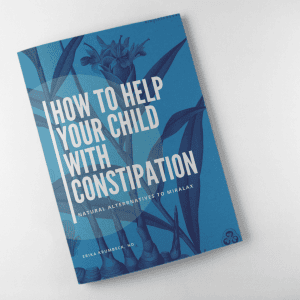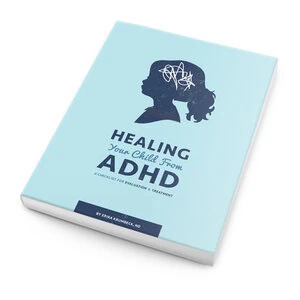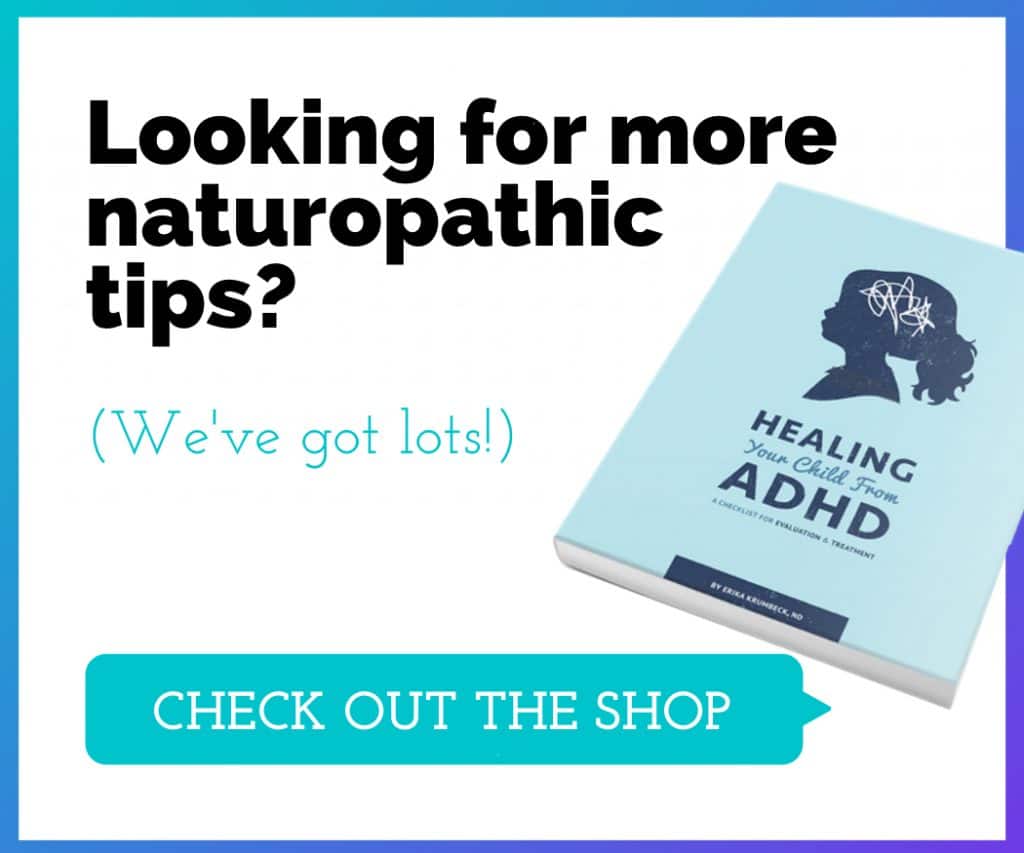Quercetin supplementation for children: research, safety and efficacy
Are you a healthcare provider? Read our research summary of Quercetin on Naturopathic Pediatrics PRO, our website for professionals.
What Is Quercetin?
Quercetin is a natural plant pigment, or flavonol, found in a wide variety of fruits, vegetables, nuts, and grains. Known for its powerful antioxidant properties, quercetin helps neutralize free radicals that can cause inflammation and contribute to chronic diseases. It is widely studied for its anti-inflammatory, antihistamine, vasodilator, antihypertensive, and anti-obesity effects. In addition, quercetin helps protect against oxidative stress, reduces blood clots, and may prevent tissue damage caused by certain medications.
Clinical Uses of Quercetin
Quercetin is most commonly used for the prevention and treatment of seasonal allergies. It works by stabilizing mast cells and preventing the release of histamine, which causes symptoms like sneezing, itching, and watery eyes. Beyond allergies, quercetin is also studied for its antiviral, anti-inflammatory, and potential anticancer effects. It has demonstrated cardiovascular, gastrointestinal, and metabolic benefits as well.
Quercetin supports the immune system, improves cognitive function in certain populations, and shows potential in reducing the severity of viral infections. Because of its wide-ranging effects, it is one of the most commonly used bioflavonoids for individuals with inflammatory and metabolic disorders.
Food Sources of Quercetin
Quercetin is concentrated in the peels and outer layers of many plant foods. Rich sources include caper berries, onions, shallots, broccoli, apples, cherries, red grapes, berries, tomatoes, kale, Brussels sprouts, cabbage, citrus fruits, almonds, pistachios, buckwheat, and olive oil.
Since quercetin is lipophilic, it is best absorbed when consumed with dietary fats. Adding olive oil, avocados, or nuts to quercetin-rich meals may help boost its absorption.
Quercetin Supplements vs. Food Sources
While food sources of quercetin are ideal for general health, they may not provide enough for therapeutic effects. Clinical studies often use 500–1000 mg per day of quercetin—amounts difficult to obtain from diet alone. For allergy relief or immune support, a high-quality supplement may be necessary.
Quercetin Dosage
The typical adult dose is 500–1000 mg per day. For children, a weight-based approach is advised, usually 25–50% of the adult dose depending on age and body size. It may take 6–8 weeks of continuous use before seeing the full benefit, making it ideal to start before allergy season.
Side Effects and Cautions
Quercetin is generally well tolerated, though some people report headache, numbness, or tingling. In sensitive individuals, it can cause agitation, anxiety, or insomnia. These effects may be more common in patients with MAOA or COMT polymorphisms.
Intravenous quercetin is associated with more serious side effects, including nausea, vomiting, shortness of breath, and kidney damage, and should only be administered under supervision by a board-certified Naturopathic Oncologist (FABNO).
Medication Interactions
Quercetin may affect the metabolism of several medications by influencing enzymes such as CYP450s (CYP1A2, 2C9, 3A4, etc.), UGTs, and SULTs. This could alter drug concentrations, especially with chemotherapeutics or medications with narrow therapeutic windows. Quercetin may also inhibit MAOA and COMT enzymes, and should be avoided in individuals taking MAOI medications or those with known MAOA/COMT slow metabolizer SNPs.
Is Quercetin Safe for Children?
While safety studies in children are limited, data from adult studies support the safety of quercetin when taken orally in moderate doses. Based on this research and clinical experience, quercetin is likely safe in children when used in weight-appropriate doses. However, it should be used with caution in children with insomnia, anxiety, or those taking medications metabolized by affected enzymes.
-
 My Health Binder For Kids (Printable E-book)$18.00
My Health Binder For Kids (Printable E-book)$18.00 - Product on sale
 How to Help Your Child with Constipation – Natural Alternatives to Miralax (E-book)Original price was: $25.00.$15.00Current price is: $15.00.
How to Help Your Child with Constipation – Natural Alternatives to Miralax (E-book)Original price was: $25.00.$15.00Current price is: $15.00. - Product on sale
 Healing your child from ADHD (E-Book)Original price was: $25.00.$15.00Current price is: $15.00.
Healing your child from ADHD (E-Book)Original price was: $25.00.$15.00Current price is: $15.00.
Clinical Uses in Naturopathic Medicine
Seasonal Allergies
Quercetin inhibits mast cells, histamine release, leukotrienes, and inflammatory cytokines. It helps shift Th1/Th2 balance, modulates IgE production, and decreases oxidative stress in the respiratory tract.
Viral Respiratory Infections
Quercetin helps prevent viral replication and entry into cells. It works synergistically with vitamin C and zinc to boost immune response and reduce symptom severity in colds and flu.
Chronic Inflammation
In adults, quercetin at 500 mg/day has been shown to reduce CRP levels, a key inflammatory marker. This may benefit conditions like heart disease, arthritis, and metabolic syndrome.
Cognitive Function, ADHD, ASD, and Depression
Animal studies suggest neuroprotective effects and improved mitochondrial function. Though human data is limited, some studies suggest a role in autism and ADHD. Clinically, quercetin may support mood in dopamine-deficient teens but should be avoided in those with anxiety.
Other Promising Uses
Early research shows potential benefits in lowering blood pressure, protecting LDL from oxidation, and supporting bladder health, athletic performance, and longevity.
Summary
Quercetin is a versatile antioxidant flavonoid with a wide array of benefits, from reducing allergy symptoms to supporting immune and brain health. Though food sources are excellent for general wellness, supplements may be necessary for therapeutic effects. Side effects are rare but possible, especially in sensitive individuals or those with genetic polymorphisms. When used appropriately, quercetin is a valuable tool in naturopathic pediatric and family medicine.
Disclaimer: This article is for educational purposes only and is not a substitute for medical advice. Always consult your healthcare provider before starting any new supplements.n a safe dose for children. It can take up to 6-8 weeks for effects to be seen, so initiating supplementation before allergy season begins is recommended.
References:
- Anand David AV, Arulmoli R, Parasuraman S. Overviews of Biological Importance of Quercetin: A Bioactive Flavonoid. Pharmacogn Rev. 2016;10(20):84-89. doi:10.4103/0973-7847.194044
- Lakhanpal P, Rai D. Quercetin: A Versatile Flavonoid. Internet Journal of Medical Update. 2007;2(2).
- Begum AN, Terao J. Protective effect of quercetin against cigarette tar extract-induced impairment of erythrocyte deformability. J Nutr Biochem. 2002;13(5):265-272. doi:10.1016/s0955-2863(01)00219-4
- Wang R, Yang L, Li S, et al. Quercetin Inhibits Breast Cancer Stem Cells via Downregulation of Aldehyde Dehydrogenase 1A1 (ALDH1A1), Chemokine Receptor Type 4 (CXCR4), Mucin 1 (MUC1), and Epithelial Cell Adhesion Molecule (EpCAM). Med Sci Monit. 2018;24:412-420. Published 2018 Jan 21. doi:10.12659/msm.908022
- Kaşıkcı M. B, Bağdatlıoğlu N. Bioavailability of Quercetin. Curr Res Nutr Food Sci 2016;4(Special Issue Confernce October 2016).
- Mlcek J, Jurikova T, Skrovankova S, Sochor J. Quercetin and Its Anti-Allergic Immune Response. Molecules. 2016; 21(5):623. https://doi.org/10.3390/molecules21050623G
- Shyamala Ganesan S, Faris AN, Comstock AT, et al. Quercetin inhibits rhinovirus replication in vitro and in vivo. Antiviral Res. 2012;94(3):258-271. doi:10.1016/j.antiviral.2012.03.005
- Mohammadi-Sartang M, Mazloom Z, Sherafatmanesh S, Ghorbani M, Firoozi D. Effects of supplementation with quercetin on plasma C-reactive protein concentrations: a systematic review and meta-analysis of randomized controlled trials. Eur J Clin Nutr. 2017;71(9):1033-1039. doi:10.1038/ejcn.2017.55
- Javadi F, Ahmadzadeh A, Eghtesadi S, et al. The Effect of Quercetin on Inflammatory Factors and Clinical Symptoms in Women with Rheumatoid Arthritis: A Double-Blind, Randomized Controlled Trial. J Am Coll Nutr. 2017;36(1):9-15. doi:10.1080/07315724.2016.1140093
- Sabogal-Guáqueta AM, Muñoz-Manco JI, Ramírez-Pineda JR, Lamprea-Rodriguez M, Osorio E, Cardona-Gómez GP. The flavonoid quercetin ameliorates Alzheimer’s disease pathology and protects cognitive and emotional function in aged triple transgenic Alzheimer’s disease model mice. Neuropharmacology. 2015;93:134-145. doi:10.1016/j.neuropharm.2015.01.027
- Serban M, et al. Effects of Quercetin on Blood Pressure: A Systematic Review and Meta‐Analysis of Randomized Controlled Trials. Journal of the American Heart Association. 2016;5:e002713.
- Liu, et al. Impact of quercetin-induced changes in drug-metabolizing enzyme and transporter expression on the pharmacokinetics of cyclosporine in rats. Molecular Medicine Reports. 2016;14.4: 3073-3085.
- Alvarez-Arellano L, Salazar-García M, Corona JC. Neuroprotective Effects of Quercetin in Pediatric Neurological Diseases. Molecules. 2020 Nov 28;25(23):5597. doi: 10.3390/molecules25235597

Katherine
April 13, 2023 at 12:30 amWhere can one find quality quercetin supplements for children? This has been a mystery to me! I found one brand of gummies online, but when I re-ordered them recently – they were not the same color, texture, smell, or quality and yet had the exact same batch number as before. I checked negative reviews and there were loads of comments from people who had tried to contact the company, etc. I chucked the remainder in the trash. (I was not keen on the extra sugar, either, but overlooked because was quercetin!).
We purchased a seasonal allergy supplement that contains quercetin from our pediatrician. It is a chewable tablet. It helps, but I am concerned because it also contains xylitol. I am a fan of chewing gum with xylitol on occasion, but I do not think it is healthy for my child’s gut to be eating it twice daily for an entire season… .
Where can a parent find a quality supplement that does not have loads of sugar or sugar substitutes?
Erika Krumbeck, ND
May 12, 2023 at 2:49 pmHi Katherine,
Sorry for the long delay.
You may want to check out our Fullscript account for high-quality supplements: https://mailchi.mp/naturopathicpediatrics/6d334j3zyw
I like Quercetin Ascorbate from Designs for Health, and D-Hist Junior.
Some kids with IBS don’t do well with Xylitol, but otherwise it is quite safe. In fact, Xylitol can reduce risk of dental cavities and sinus infections in kids.
Mary Afeman
April 11, 2023 at 12:38 pmThank you for this helpful information! Are there any specific supplements you would recommend, or what would be the things to look for in choosing a quercetin supplement?